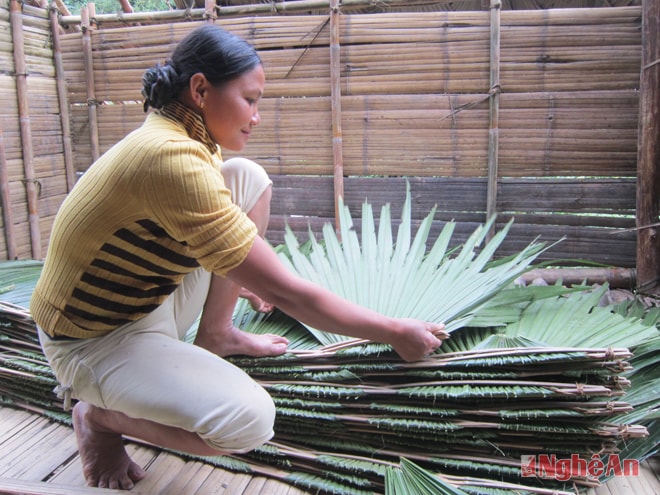Building a tent for children to learn to read and write in Con Phen
(Baonghean) - In winter, the Ban Ve Hydropower Reservoir becomes colder because of the accumulation of cold air from the mountains and forests, and the coldness of the vast lake surface. In the distance, temporary tents on the banks of the stream at the beginning of Con Phen village, Huu Khuong commune (Tuong Duong) seem to be shivering in the cold. That is where 18 students of Huu Khuong Primary School live. Their parents are drifting, busy making a living in the middle of the lake, forcing their children to set up tents to "pick up letters"...
Mr. Bui Van Hao - Principal of Huu Khuong Primary School said: “This is the accommodation for students in Cha Coong, Xop Lam, Kim Hong, Nhan Nhinh, Nhan Mai and Nhan Pa. These villages are subject to relocation to resettlement areas in Thanh Chuong, some households either deliberately do not relocate, or have relocated but then returned to their hometowns to make a living. Children of these households have to study at Con Phen school, the school does not have a boarding house, because they do not have a local household registration, so they do not enjoy preferential treatment from the State. Therefore, when coming to study here, parents have to take care of their own food, accommodation and contributions.”
 |
| Weaving thatch to make tents for boarding students. |
We walked towards the row of tents, very simple, precariously located on the stream bank. The roof was thatched with palm leaves, the fence was woven with bamboo, the pillars were made of low, small forest trees. It felt like just a strong wind would blow everything down the stream, drifting towards the lake. We arrived just as Mr. Lo Van Phuong and his wife were repairing the tent for their children to stay and study. The husband was busy with a saw and a plank to make a door. The wife was meticulous with each palm leaf to weave thatch. Mr. Phuong shared: "My wife and I built this tent several months ago so that our children would have a place to stay and study, because the road is far, we have to go by boat so we can't go back and forth during the day, and our parents don't have time to pick us up. Last week when we came back, our child said the tent was leaking, the wind blew in and it was so cold that he couldn't sleep, so we had to hurry up and fix it to make it more airtight, so that the children wouldn't be cold." Looking at the couple's faces, we could read their hardships and worries...
Around noon, after the school bell rang, the children returned to their huts one by one to prepare meals. Following them into the hut, the furniture inside was very simple. The platform made of bamboo took up most of the space. It was a place to rest, a place to sit and study, and a place to store books, and a place to prepare daily meals. Next was the kitchen, surrounded by dry firewood; pots, pans, buckets, basins and dishes. The children divided each person's work, some went down to the stream to wash rice, some picked vegetables, some washed dishes. Lunch was only wild vegetable soup with rice, but the children ate very deliciously, laughing and talking happily as if those deprivations and disadvantages were nothing compared to their passion for learning. Luong Van Nguyen, a fourth grader from Cha Coong, said: “Today is almost the weekend, the food reserves brought from home are almost gone. I was busy studying in the morning and couldn’t go fishing, so I had to eat this for now. When I get home early in the afternoon, I will go down to the stream to catch fish to improve my meal!”
When the night covered the Huu Khuong forest, the cold of the night seemed to penetrate into every skin and muscle, we borrowed a flashlight and followed the steep path back to the children's tents. From the 6 small tents on the stream bank, weak rays of light from oil lamps shone through the gaps in the bamboo fence. Everything was quiet and still in the darkness, amidst the vastness of the mountains and forests and the thick fog. Occasionally, from inside the tents, there were the sounds of "eh, ah" studying and the children talking. Those sounds quickly blended with the murmuring stream and the rustling wind of the forest. Suddenly, a feeling of compassion and contemplation arose in our hearts about the deprivation and hardships of the children living in those makeshift tents. If only their parents could rest assured about living and working in the resettlement area, it might be difficult and difficult in the short term, but the children's education and future would be much brighter. On the other hand, they still cling to their old hometown to live, even though they no longer have a household registration there, forcing their children to endure many disadvantages, making the journey to find education extremely difficult and arduous...
Cong Kien






